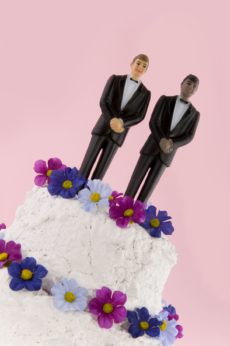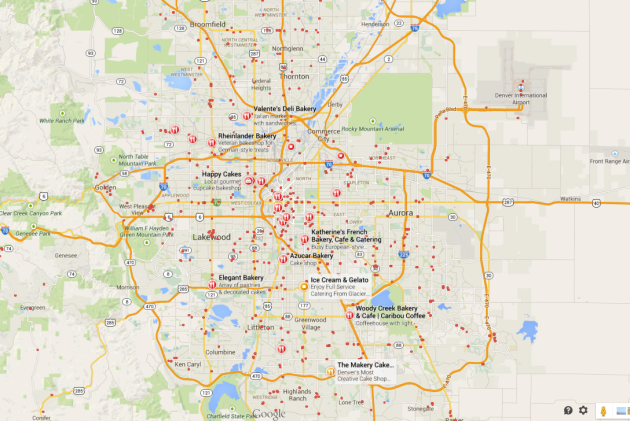Let Them Eat Cake
 In January of this year, a Denver bakery found itself at the center of a civil rights controversy. The crime? The bakery refused customer Bill Jack’s request to put an anti-gay message (“God Hates Gays”) on a cake. He reported that he felt as though the bakery discriminated against him based on his “creed.”
In January of this year, a Denver bakery found itself at the center of a civil rights controversy. The crime? The bakery refused customer Bill Jack’s request to put an anti-gay message (“God Hates Gays”) on a cake. He reported that he felt as though the bakery discriminated against him based on his “creed.”
In response to the claim, the bakery’s owner, Marjorie Silva, stated that, “it’s unfair that he’s accusing me of discriminating when I think he was the one that is discriminating.”
Almost immediately, people came to Silva’s defense. Her supporters claimed that she had every right to deny Jack’s request. Her personal convictions differed from those of her customer, so why should she be forced to cater to his request? There are a multitude of other bakeries who would have likely supplied the requested confection.
This isn’t the first time a Colorado bakery has come under fire for its decisions regarding the LGBT community. In fact, a judge recently ruled that Colorado’s Masterpiece Cakeshop had unlawfully discriminated against a gay couple for refusing to sell them a wedding cake.
In this case, however, the sympathies went to the customers, and not the store’s owner.
This is puzzling. In both cases you have a store owner refusing to serve a particular client because their personal beliefs conflict with those of their customer. However, the reactions have been very different. In both of these cases, however, the parties have called upon the government’s anti-discrimination laws to compel the other party to compensate them.
Why is it that we should be discussing whether or not we should force bakers to make gay wedding cakes, straight wedding cakes, anti-gay cakes, etc.? Allow me to argue that there is another way to deal with this issue—let the market sort this one out.

Above is a quick Google search of the bakeries in Denver. Every one of the red dots represents a bakery. As you can see, that’s a lot of pastries. Now, let’s suppose that some of these bakeries, say 25%, have a problem making wedding cakes for same-sex weddings. This means there are 75% of bakeries that would make the cake. Perhaps a subset of these bakeries specialize in same-sex wedding cakes (to answer your question, no, I don’t know what a same-sex wedding cake looks like vs. a traditional one other than maybe the cake topper…work with me).
What would happen in this case? Certain bakeries would get reputations for making particular cakes and serving a certain clientele. After word gets out, those in search of same-sex wedding cakes go to bakeries that will make them and avoid the ones who don’t. Those who are offended by the idea of same-sex marriage don’t have to compromise their convictions–producers or consumers. Same goes for those who are offended by a strictly heterosexual interpretation of marriage.
This idea makes many people uncomfortable. In response to this idea, many people would say that we should just ban this idea all together because “discrimination is wrong.” If we allowed businesses to refuse service to particular groups based on sexual orientation, or race, age, etc., then we’d wind up with a pre-civil rights era world of restaurants, theaters, bakeries, etc. completely excluding particular groups.
Perhaps we should let them. Why? Because they bear the full cost of that choice.
Here’s an example.
Let’s say a restaurant owner is a misogynist. He just can’t stand women. As a result, he makes his eatery a “men only” establishment. What are the consequences of this decision? First, he loses out on the business he might earn from women coming to eat in his restaurant. Since women make up about 50% of the population, he’s eliminating a potentially large source of revenue. In addition to this, he loses out on a variety of male customers who want to bring their wives, girlfriends, etc. Further, many people, including a lot of men, will find the owner’s policy offensive. As a result, they will refuse to eat there. The owner sees his profits fall. Most likely, he will be forced to close his business.
So what can the owner do? He can continue to indulge his preferences of discriminating against women and lose a ton of business or he can serve women and potentially increase his revenues.
Put simply, the market tempers his discrimination. The market forces of profit and loss mean that he bears the full cost of his bias against women.
Let’s bring this back to the idea of bakeries and wedding cakes for same-sex marriages. If a bakery refuses to make a cake for a gay wedding, or refuses to put an anti-gay message on a cake, they bear the cost of those preferences. As a result, they will lose the business of a particular group of people. In addition, just as in the example above, they will likely lose additional customers who identify with the group or find the bakery’s policy offensive. It will negatively impact the bakeries. They will either a. continue to refuse service to the particular group and lose business or b. relax their restrictions.
The current policies of anti-discrimination doesn’t eliminate bigotry. As I’ve discussed elsewhere, anytime you prohibit something you merely succeed at pushing it under ground. Moreover, current policies require monitoring and enforcement costs. As the example above illustrates, the market acts as its own monitor and enforcer–putting financial and competitive pressures on those with extreme (and unpopular) preferences.
Put simply, allowing people to indulge their preferences, or discriminate, have significant consequences in the marketplace. In this case, allowing the market to handle the situation means that everyone gets to have their cake and eat it too.


















